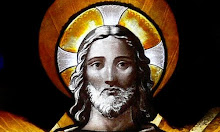When I decided to resume posting to this blog, I did so because I determined that it might be useful for me to sharpen the focus of my personal search for a close (or at least closer) relationship with God and a clearer understanding of just who it is that I profess to believe in and worship. So where do I begin?
I suppose that as good as place to begin as any is to allow my mind the opportunity to wonder a bit to the visual images through which I sometimes see God, images such as God the Father, God the Son, God the Holy Spirit, even God the unknown as He was to Moses.




 Several years ago I read a book by Dr. J. I. Packer (Anglican priest and theologian and one of the theological editors of the English Standard Version of The Bible) entitled, Knowing God. Dr. Packer is an Anglican Evangelical and the premise of his work (the second edition was published in 1973) is that modern “believers” must not just know about God, they must know him personally and intimately, which means growing in one’s relationship with Him - - to know His nature and character. As Dr. Packer put it, “… we are cruel to ourselves if we try to live in this world without knowing about the God whose world it is and who runs it. … Disregard the study of God and you sentence yourself to stumble and blunder through life blindfolded, as it were, with no sense of direction and no understanding of what surrounds you. This way you can waste your life and lose your soul.”
Several years ago I read a book by Dr. J. I. Packer (Anglican priest and theologian and one of the theological editors of the English Standard Version of The Bible) entitled, Knowing God. Dr. Packer is an Anglican Evangelical and the premise of his work (the second edition was published in 1973) is that modern “believers” must not just know about God, they must know him personally and intimately, which means growing in one’s relationship with Him - - to know His nature and character. As Dr. Packer put it, “… we are cruel to ourselves if we try to live in this world without knowing about the God whose world it is and who runs it. … Disregard the study of God and you sentence yourself to stumble and blunder through life blindfolded, as it were, with no sense of direction and no understanding of what surrounds you. This way you can waste your life and lose your soul.”
But simply studying about God (the intellectual act of study) doesn’t necessarily mean that after our study we will actually know God. Dr. Packer points out that simply amassing knowledge about God and developing the capacity to think clearly and talk well about principles of theology is not the same thing as knowing God. He is very direct in stating that even with all our knowledge about God, we may not know God at all if we do not take the knowledge learned and process it through prayerful meditation so that we allow God to speak to us through the knowledge acquired and to transform us in the process.
Methodist bishop Rueben P. Job, in the first section his book Three Simple Questions, addresses the same general question, “Who is God?” Right at the beginning, Bishop Job uses these words to set the stage for why we strive to know God: “Our identity is found and formed by the God we worship and serve. Our life together as Christians is discovered, held together, and lived out based on our understanding of the God we have come to know and seek to follow.” Stated another way, God is the glue of our lives and our world; without Him, we (as individuals and as a family of creation [His creation], fall apart.
This notion that God is the glue of our lives and world is why people of faith [in God] strive so to understand God’s nature and this thing that we call “the faith.” Truth be known, whether people profess “to believe” or not, my heart tells me that in those times where they are alone, perhaps down on their luck, perhaps ill, perhaps shunned, perhaps in financial difficulty, those same people long for something bigger than themselves in which to believe, to look to for guidance, comfort, strength and, in a word, love. Whether they recognize it or not, they search for God, and to know Him, and to love Him and feel His love for them.
I’m going to unpack this subject a bit more in the next post and viewed from two different perspectives or approaches, those of Dr. Packer and Bishop Job. But for now and in closing, I end this post with these words from Acts 17:23b-28:
“What you worship as unknown, I now proclaim to you. God who made the world and everything in it, is Lord of heaven and earth. He doesn’t live in temples made with human hands. Nor is God served by human hands, as though he needed something, since he is the one who gives life, breath, and everything else. From one person God created every human nation to live on the whole earth, having determined their appointed times and the boundaries of their lands … In fact, God isn’t far away from any of us. In God we live, move and exist. As some of your own poets said, ‘We are his offspring.’”
God’s peace. <><
 Several years ago I read a book by Dr. J. I. Packer (Anglican priest and theologian and one of the theological editors of the English Standard Version of The Bible) entitled, Knowing God. Dr. Packer is an Anglican Evangelical and the premise of his work (the second edition was published in 1973) is that modern “believers” must not just know about God, they must know him personally and intimately, which means growing in one’s relationship with Him - - to know His nature and character. As Dr. Packer put it, “… we are cruel to ourselves if we try to live in this world without knowing about the God whose world it is and who runs it. … Disregard the study of God and you sentence yourself to stumble and blunder through life blindfolded, as it were, with no sense of direction and no understanding of what surrounds you. This way you can waste your life and lose your soul.”
Several years ago I read a book by Dr. J. I. Packer (Anglican priest and theologian and one of the theological editors of the English Standard Version of The Bible) entitled, Knowing God. Dr. Packer is an Anglican Evangelical and the premise of his work (the second edition was published in 1973) is that modern “believers” must not just know about God, they must know him personally and intimately, which means growing in one’s relationship with Him - - to know His nature and character. As Dr. Packer put it, “… we are cruel to ourselves if we try to live in this world without knowing about the God whose world it is and who runs it. … Disregard the study of God and you sentence yourself to stumble and blunder through life blindfolded, as it were, with no sense of direction and no understanding of what surrounds you. This way you can waste your life and lose your soul.” 














2 comments:
I am so touched by the words but am inspired by the small pictures and side notes. I, of course, will be a devoted fan.
Joe
I am glad you are blogging again. I as you have found the political life of the church a drag on my personal relationship with God. Jesus told us simply to love our neighbors, even though Paul related some rules of discipline it did not erase the original charge from Jesus.
I will be reading your " ramblings" God's peace.
YBIC
Mike
Post a Comment